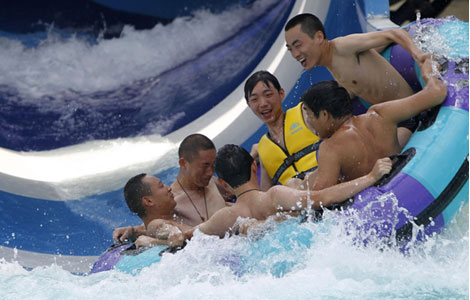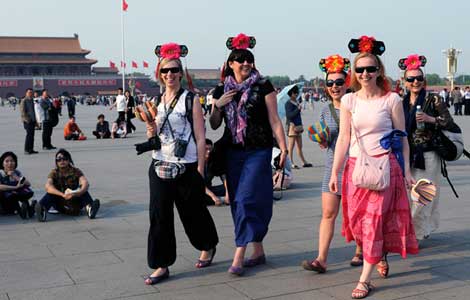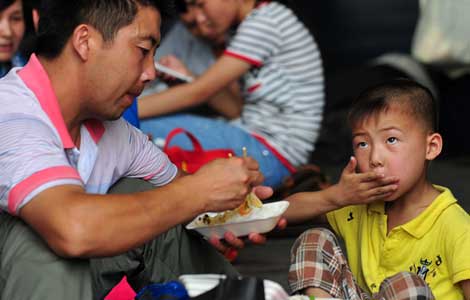FDI to maintain growth in H2, official says
Updated: 2013-07-26 01:12
By Li Jiabao (China Daily)
|
||||||||
Economic restructuring process seen boosting the confidence of international investors
Foreign direct investment in China is likely to maintain its momentum in the second half while the whole year will see overall FDI inflow basically match that of last year, a commerce official said on Thursday.
"I believe that FDI in the second half of the year will continue to maintain growth as we are taking measures to improve the investment environment and boost industries, in line with the country's economic restructuring process, which will strengthen the confidence of global investors," said Cao Hongying, deputy director-general of the Foreign Investment Administration at the Ministry of Commerce.
"FDI inflow throughout the year will be basically the same as last year," Cao added.
China attracted $111.72 billion in FDI last year, down 3.7 percent from a year earlier. The first half of this year saw foreign investors establishing 10,630 companies in the country, down 9.18 percent year-on-year, while FDI inflow rose 4.9 percent year-on-year to $61.98 billion, according to the ministry.
The service sector continued to outstrip the manufacturing sector in the January-June period with FDI inflow of $30.63 billion, up 12.43 percent year-on-year, while foreign spending in the sector dropped 2.14 percent year-on-year to $26.44 billion.
"Foreign investors in China set up more than 230 new businesses in the real estate sector in the first half of this year, up 30 percent year-on-year, with spending of $13.4 billion, up 10 percent year-on-year," Cao said. "China has strict controls on FDI inflow in the real estate sector, where the foreign spending accounted only for a small share of the total investment in the first half."
FDI inflow in June surged 20.12 percent year-on-year to $14.39 billion, the largest increase since March 2011, and also the fifth-consecutive monthly increase since February, while analysts worry that speculative funds flowed in disguised as project spending.
Cao said the statistics are solid and reliable.
"In the next stage, we'll deepen the reforms on FDI management and simplify the access of foreign investors to China. Local governments will be asked to improve the investment environment. Foreign investment will be encouraged to serve the country's industrial upgrading process and shift plants to central and western regions rather than to our neighboring countries," Cao said.
China's flagship investment fair — the China International Fair for Investment and Trade — or CIFIT, is scheduled to be held in Xiamen, Fujian province, from Sept 8 to 11. The sluggish world economy, including the weak global trade and constrained cross-border investment environment, underscores the fair's objective of boosting capital flow amid the global economic restructuring process, said Zhang Canmin, deputy mayor of the city.
The World Trade Organization joined the event this year as a co-organizer along with the United Nations Conference on Trade and Development, the United Nations Industrial Development Organization, the Organization for Economic Co-operation and Development, the World Bank and the World Association of Investment Promotion Agencies.
Liu Dianxun, director of the ministry's Investment Promotion Agency, said that this year's CIFIT will boost the country's economic restructuring process and lead to improvements in the economy.
"It's estimated that China's outward investment will maintain strong momentum in the coming years following China's continuous economic growth," Liu said.
The Commerce Ministry's spokesman, Shen Danyang, said that detailed plans and policies will be published following the State Council's pledge to facilitate trade, which will boost not only exports but also imports. But he added that China's foreign trade counts more on entrepreneurs to enhance their competitiveness.
Most Viewed
Editor's Picks

|

|

|

|

|

|
Today's Top News
Spain investigators: Train driver was on phone
Apple faces more staff abuse charges
Spending surge for renewables
Beijing and Canberra to resume trade talks
Top leader vows to meet growth target
2,290 disciplined for extravagance
Japan diplomat seeks to mend ties
Draft rule requires a license for dog breeding
US Weekly

|

|















